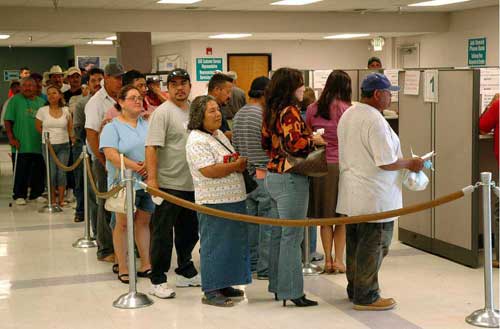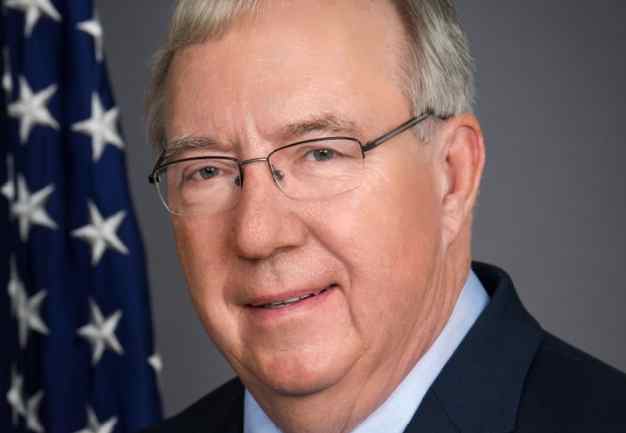WASHINGTON – U.S. unemployment compensation claims dropped again last week to their lowest level in more than a year, the Labor Department reported Thursday, as the world’s largest economy continues to show signs it is recovering from the coronavirus pandemic.
The government said 547,000 workers filed for benefits last week, down 39,000 from the revised figure of the previous week. It was the lowest weekly total since mid-March last year, and only the third time in the last 13 months that the weekly total of new jobless benefit claims fell below 700,000.
Until the pandemic, the highest U.S. weekly claims total dating back to the 1960s was 695,000, after reaching a peak of 6.9 million claims 13 months ago. By comparison, unemployment compensation claims in 2019 — before the pandemic began — averaged 218,000 a week.
There is a reason for the continued favorable outlook.
With a third of U.S. adults now fully vaccinated, some people are spending again on gym memberships, restaurant dining and vacation travel they may have done without over the last year, which could lead to more hiring to accommodate customers. There has been a surge in retail sales and job openings.
Some state governors are revoking orders for people to wear face masks and allowing businesses to fully reopen or setting dates in coming weeks when they say businesses can ramp up.
Still, employers in many states continue to face directives to curtail operations and tens of thousands of new coronavirus cases are being recorded every day, even as millions of people are being vaccinated. Those arriving for dinner in a restaurant, sometimes for the first time in a year, still find many establishments cordoning off every other table to keep customers safely distanced from each other.
The employment picture in the U.S. could continue to improve as money from President Joe Biden’s $1.9 trillion coronavirus relief package filters through the economy. The measure could help boost hiring and consumer spending, as millions of Americans, all but the highest wage earners, are now receiving $1,400 stimulus checks from the government.
More than 3 million Americans are now being vaccinated against the virus daily, with Biden saying that all adults who want a vaccination are now eligible to get one. It could take weeks, however, for many people to schedule their inoculation appointments and for the effect of the vaccinations to take hold.
More than 87 million American adults are fully inoculated with one of the three available vaccines, although millions of people remain skeptical of the vaccine for various reasons and say they will refuse to get inoculated. [content id=”79272″]
‘Inflection point’
U.S. employers added 916,000 jobs in March and the unemployment rate fell to 6%. There has also been a recent surge in job openings, indicating employers are looking to expand staffing. The country’s central bank, the Federal Reserve, predicts the jobless rate could drop further to 4.5% later this year.
The Fed is expecting the economy to grow by 6.5% this year compared to its previous projection of 4.2%, with the growth rate slowing to 3.9% in 2022 and 3.5% in 2023.
But Federal Reserve chair Jerome Powell remains cautious about the economic outlook.
In a recent “60 Minutes” interview on CBS, Powell described the American economy as being at “an inflection point,” showing signs of advancing but still facing risks.
“There really are risks out there,” Powell said. “And the principal one just is that we will reopen too quickly, people will too quickly return to their old practices, and we’ll see another spike in cases.”
He said another challenge is whether more than about 8 million jobs that vanished in 2020 will return at all. Powell said the “economy that we’re going back to is going to be different from the one that we had,” making it harder for some people, particularly low-income workers, to regain a foothold in the labor force. Some economists project that it could take three years to recover all the lost jobs.
Under the $1.9 trillion relief deal, the federal government is continuing to make $300-a-week extra payments to the jobless into early September, on top of less generous state benefits, a provision that will help millions of unemployed until their old jobs are restored, or they find new work.
U.S. employers have called back millions of workers who were laid off during business shutdowns in 2020. But some hard-hit businesses have been slow to ramp up operations again or have closed permanently, leaving workers idled or searching for new employment.
The coronavirus relief measure, however, almost certainly will give a new boost to the economy, easing the path for many employers to keep workers on their payrolls as coronavirus restrictions are gradually eased.
The U.S. has now recorded 569,000 coronavirus deaths and more than 31.8 million infections, both figures higher than that being reported in any other country, according to Johns Hopkins University.
[content id=”52927″]





